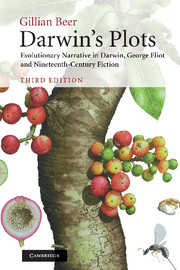Book contents
- Frontmatter
- Contents
- Foreword by George Levine
- Preface to the first edition
- Preface to the second edition
- Preface to the third edition
- Introduction
- Part I Darwin's language
- 1 ‘Pleasure like a tragedy’: imagination and the material world
- 2 Fit and misfiting: anthropomorphism and the natural order
- Part II Darwin's plots
- Part III Responses: George Eliot and Thomas Hardy
- Notes
- Select bibliography of primary works
- Further reading related to Charles Darwin
- Index
2 - Fit and misfiting: anthropomorphism and the natural order
Published online by Cambridge University Press: 04 August 2010
- Frontmatter
- Contents
- Foreword by George Levine
- Preface to the first edition
- Preface to the second edition
- Preface to the third edition
- Introduction
- Part I Darwin's language
- 1 ‘Pleasure like a tragedy’: imagination and the material world
- 2 Fit and misfiting: anthropomorphism and the natural order
- Part II Darwin's plots
- Part III Responses: George Eliot and Thomas Hardy
- Notes
- Select bibliography of primary works
- Further reading related to Charles Darwin
- Index
Summary
In the Introduction to the 1814 edition of The Excursion Wordsworth discussed the philosophical enterprise in which his poem was engaged and set forth his aspirations for man: the hope that the ideal may be ‘A simple produce of the common day’, by means of ‘the discerning intellect of man’ ‘wedded to this goodly universe’. In the ‘wedding’ (the unification and harmonising of mind and universe) the outcome is to be a lyrical materialism, a faith that finds its form in the common appearances and daily objects of the world. ‘Simple produce’ suggests not only what is intellectually produced by the union, but ‘daily bread’. And ‘common day’ is not only ordinary, but brotherly, even universal – that which is held in common. The idea of things held in common, of the extraordinary kinships implicit in the ordinary, is deeply felt by Darwin also, whom we know to have immersed himself in Wordsworth's poem. He sought a kind of inverted Platonism in which ideas find their truest form in substance.
Wordsworth continues to analyse the harmony between mind and universe in a famous passage which he added to the first version of his proposal. In it he sets forth his ideal theme:
How exquisitely the individual mind
(And the progressive powers perhaps no less
Of the whole species) to the external world
Is fitted; – and how exquisitely, too,
Theme this but little heard among men,
The external world is fitted to the mind.
- Type
- Chapter
- Information
- Darwin's PlotsEvolutionary Narrative in Darwin, George Eliot and Nineteenth-Century Fiction, pp. 44 - 70Publisher: Cambridge University PressPrint publication year: 2009



